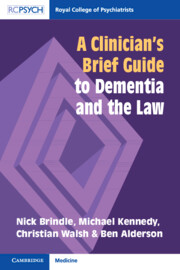Book contents
- A Clinician’s Brief Guide to Dementia and the Law
- A Clinician’s Brief Guide to Dementia and the Law
- Copyright page
- Contents
- Preface
- Common Abbreviations
- Chapter 1 Dementia
- Chapter 2 Dementia
- Chapter 3 Dementia
- Chapter 4 The Mental Capacity Act 2005
- Chapter 5 The Mental Health Act 1983
- Chapter 6 The Care Act 2014
- Chapter 7 Assessment of Capacity
- Chapter 8 The Diagnosis of Dementia
- Chapter 9 Care and Treatment Issues and the Law
- Chapter 10 Deprivation of Liberty
- Chapter 11 Discharge from Hospital
- Chapter 12 Abuse and Safeguarding
- Chapter 13 The Courts and Tribunals
- Chapter 14 The Interface between Dementia and the Criminal Justice System
- Book part
- References
- Index
Chapter 14 - The Interface between Dementia and the Criminal Justice System
Published online by Cambridge University Press: 20 July 2023
- A Clinician’s Brief Guide to Dementia and the Law
- A Clinician’s Brief Guide to Dementia and the Law
- Copyright page
- Contents
- Preface
- Common Abbreviations
- Chapter 1 Dementia
- Chapter 2 Dementia
- Chapter 3 Dementia
- Chapter 4 The Mental Capacity Act 2005
- Chapter 5 The Mental Health Act 1983
- Chapter 6 The Care Act 2014
- Chapter 7 Assessment of Capacity
- Chapter 8 The Diagnosis of Dementia
- Chapter 9 Care and Treatment Issues and the Law
- Chapter 10 Deprivation of Liberty
- Chapter 11 Discharge from Hospital
- Chapter 12 Abuse and Safeguarding
- Chapter 13 The Courts and Tribunals
- Chapter 14 The Interface between Dementia and the Criminal Justice System
- Book part
- References
- Index
Summary
Individuals with dementia may encounter the Criminal Justice System (CJS), including the police and courts, in different capacities: as victims, witnesses or perpetrators of crimes (related or not to the diagnosis). The Living Well with Dementia strategy makes the following statement: ‘People with dementia access all services and so need informed understanding and support from all the services they come into contact with, not only from specialist dementia services. Awareness and skills are therefore needed in all sections of the workforce and society (e.g. housing, emergency services, employers, utilities, public sector services, GP receptionists, criminal justice system staff), not just those involved with dementia care.’ WhilE we think it is important to highlight this policy initiative, this chapter does not analyse how it has been implemented within the CJS. We are limiting our discussion to the legal issues relating to four areas: crimes committed against people with dementia; crimes committed by people with dementia; dementia in secure settings; and discharge of restricted patients on conditions that amount to deprivation of liberty.
- Type
- Chapter
- Information
- A Clinician's Brief Guide to Dementia and the Law , pp. 144 - 150Publisher: Cambridge University PressPrint publication year: 2023

